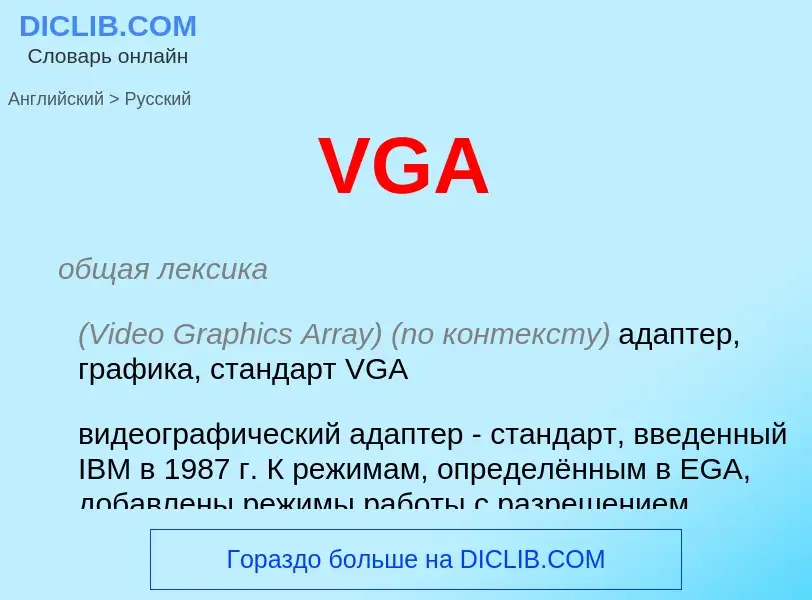Translation and analysis of words by ChatGPT artificial intelligence
On this page you can get a detailed analysis of a word or phrase, produced by the best artificial intelligence technology to date:
- how the word is used
- frequency of use
- it is used more often in oral or written speech
- word translation options
- usage examples (several phrases with translation)
- etymology
VGA, video memory, XGA - translation to English
общая лексика
(Video Graphics Array) (по контексту) адаптер, графика, стандарт VGA
видеографический адаптер - стандарт, введенный IBM в 1987 г. К режимам, определённым в EGA, добавлены режимы работы с разрешением 640x480 точек в графическом режиме с палитрой в 16 цветов и 720x400 в текстовом режиме. Его преемник - стандарт SuperVGA
(Video Gate Array) видеовентильная матрица
Смотрите также
общая лексика
Super Video Graphics Array
(по контексту) адаптер, графика, стандарт SVGA [SuperVGA]
стандарт и реализующий его графический видеоадаптер. Обеспечивает более высокое разрешение, чем стандарт VGA. Поддерживает режимы работы с разрешением 800x600, 1024x768, 1280x1024 точек (и более) с одновременным выводом на экран 16 или 256 цветов
Wikipedia

Video Graphics Array (VGA) is a video display controller and accompanying de facto graphics standard, first introduced with the IBM PS/2 line of computers in 1987, which became ubiquitous in the IBM PC compatible industry within three years. The term can now refer to the computer display standard, the 15-pin D-subminiature VGA connector, or the 640×480 resolution characteristic of the VGA hardware.
VGA was the last IBM graphics standard to which the majority of IBM PC compatible computer manufacturers conformed, making it the lowest common denominator that virtually all post-1990 PC graphics hardware can be expected to implement.
IBM intended to supersede VGA with the Extended Graphics Array (XGA) standard, but failed. Instead, VGA was adapted into many extended forms by third parties, collectively known as Super VGA, then gave way to custom graphics processing units which, in addition to their proprietary interfaces and capabilities, continue to implement common VGA graphics modes and interfaces to the present day.
The VGA analog interface standard has been extended to support resolutions of up to 2048×1536 and even higher in special applications.






![Examples of VGA images in 640×480 with 16 colors and 320×200 with 256 colors (bottom). [[Dither]]ing is used to mask color limitations. Examples of VGA images in 640×480 with 16 colors and 320×200 with 256 colors (bottom). [[Dither]]ing is used to mask color limitations.](https://commons.wikimedia.org/wiki/Special:FilePath/Torak.gif?width=200)


![[[Cirrus Logic]] GD5429 VLB SVGA video card [[Cirrus Logic]] GD5429 VLB SVGA video card](https://commons.wikimedia.org/wiki/Special:FilePath/Cirrus Logic GD5429 VLB.jpg?width=200)

![S3]] 805 VLB SVGA video card S3]] 805 VLB SVGA video card](https://commons.wikimedia.org/wiki/Special:FilePath/S3 805 VLB.jpg?width=200)
![WDC]] ISA SVGA video card WDC]] ISA SVGA video card](https://commons.wikimedia.org/wiki/Special:FilePath/WDC Video ISA.jpg?width=200)
